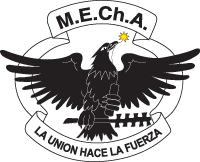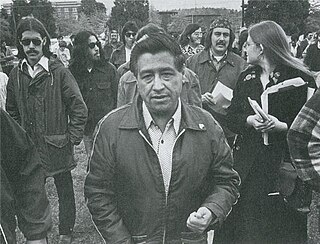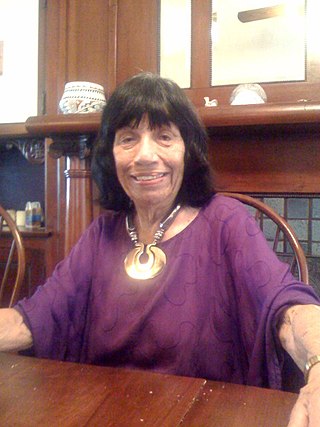Related Research Articles

M.E.Ch.A. is a US-based organization that seeks to promote Chicano unity and empowerment through political action. The acronym of the organization's name is the Chicano word mecha, which is the Chicano pronunciation of the English word match and therefore symbolic of a fire or spark; mecha in Spanish means fuse or wick. The motto of MEChA is 'La Union Hace La Fuerza'.
El Grito del Norte was a bilingual newspaper based in Española, New Mexico, co-founded by the activist Elizabeth "Betita" Martinez and the attorney Beverly Axelrod in 1968. Before this, Martínez had worked with social issues such as the black movement and the Student Nonviolent Coordinating Committee while Axelrod had been involved in the first production of The Black Panther. The tabloid was originally the publication of the Reies Tijerina's Alianza Federal de Mercedes, an organization dedicated to recovering the lands of dispossessed Hispanos, whom Axelrod represented as a lawyer. It expanded to provide coverage of the Chicano Movement in urban areas, workers' struggles and Latino political prisoners, as well as other Leftist causes. The paper often advocated for the advancement of such minority groups as well as the Black and Native American communities.

The Chicano Movement, also referred to as El Movimiento, was a social and political movement in the United States that worked to embrace a Chicano/a identity and worldview that combated structural racism, encouraged cultural revitalization, and achieved community empowerment by rejecting assimilation. Chicanos also expressed solidarity and defined their culture through the development of Chicano art during El Movimiento, and stood firm in preserving their religion.

Elizabeth "Betita" Martínez was an American Chicana feminist and a long-time community organizer, activist, author, and educator. She wrote numerous books and articles on different topics relating to social movements in the Americas. Her best-known work is the bilingual 500 years of Chicano History in Pictures, which later formed the basis for the educational video ¡Viva la Causa! 500 Years of Chicano History. Her work was hailed by Angela Y. Davis as comprising "one of the most important living histories of progressive activism in the contemporary era ... [Martínez is] inimitable ... irrepressible ... indefatigable."

Chicana literature is a form of literature that has emerged from the Chicana Feminist movement. It aims to redefine Chicana archetypes in an effort to provide positive models for Chicanas. Chicana writers redefine their relationships with what Gloria Anzaldúa has called "Las Tres Madres" of Mexican culture by depicting them as feminist sources of strength and compassion.
Francisca Flores was a labor rights activist, an early Chicana feminist, a journal editor, and an anti-poverty activist.
Demetria Martinez is an American activist, poet, and novelist.
Hijas de Cuauhtémoc was a student Chicana feminist newspaper founded in 1971 by Anna Nieto-Gómez and Adelaida Castillo while both were students at California State University, Long Beach.
Cordelia Chávez Candelaria is an American educator and writer of Hispanic descent.
Rita Martinez was a Chicana activist operating in Pueblo, Colorado.
Guadalupe "Lupe" Villalobos Briseño is a civil rights activist who led the Kitayama Carnation Strike in 1968-1969. In 2020, Briseño was recognized for her work and was inducted into the Colorado Women's Hall of Fame.
Deborah Mora Espinosa is a Chicana activist in Colorado. She worked for History Colorado as the director of El Pueblo History Museum.
Charlene Garcia Simms is a teacher-librarian from Garcia, Colorado. She and her husband founded El Escritorio Publishing which focuses on Southwest history and genealogy.
Plaza Verde Park is a park established in 1972 in Pueblo, Colorado.
Las Madres de la Casa Verde were a group of Chicana women in Pueblo, Colorado that formed to support the Chicano community in the lower eastside. They worked closely with other activist groups such as La Raza Unida and the Brown Berets.
Martín Porferio "Marty" Serna was an early organizer of the Chicano Movement, who was one of the founders of the Brown Berets in Pueblo, Colorado. He was part of the La Raza Unida political party, and developed several community organizations in Pueblo including the Black/Brown Berets, United Farmworkers Organization, Escuela Huitzhualopán, Southern Colorado Chicano Planning Council, and El Partido de la Raza Unida.
La Cucaracha (1976-1983) was an English and Spanish bilingual newspaper created by and for the Chicano community of Pueblo, Colorado. Creators Juan Espinosa, Deborah Espinosa, David Martinez and Pablo Mora recognized the exclusion of Chicanos in popular media and published the first issue in 1976.
Shirley Romero Otero is a Chicana activist who co-founded the Land Rights Council in 1977 to regain the rights for heirs of the Sangre de Cristo Land Grant. She is an educator and leader in the San Luis Valley region. She is the director of the Move Mountains Youth Project and sits on the board of directors of the Acequia Institute.
Carmen Roybal Arteaga is a Pueblo-based activist for Chicano education and historical research. She has been an advocate for bilingual and bicultural education in Pueblo schools to meet the needs of the large Chicano population. She was also known as Carmen Serna when she was married to activist Martín Serna.
Albert Gurule is a Chicano activist from Pueblo, Colorado. He was part of La Raza Unida Party and ran for Colorado governor in 1970.
References
- 1 2 3 4 5 6 7 8 9 10 Fajardo, Renee; Pierson, Todd; Winograd, Ed; Brown, Toinette (2022). Return of the Corn Mothers (PDF).
- 1 2 "Deborah Martinez Martinez, Ph.D." Calmaco.
- 1 2 Markard, Tamara (July 17, 2020). "Author highlights stories of Colorado Chicanas in new book". Greeley Tribune.
- ↑ "Workshop helps college women complete courses". The Pueblo Chieftain. January 12, 1992.
- ↑ "Protest at Columbus statue in Pueblo". KOAA. November 28, 2021.
- ↑ Mora, Pablo Carlos (July 2, 2016). "Fresh version of Pueblo's past revealed". Pueblo Chieftain.
- ↑ "Powerful Women Paper Dolls And Their Stories". La Cucaracha. May 5, 2020.
- ↑ Bohlen, Teague (May 4, 2021). "Catch Up With the Colorado Book Awards 2021 Finalist Readings". Westword.